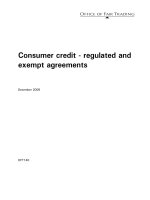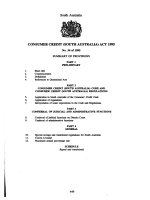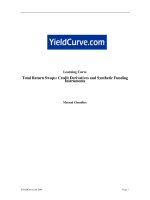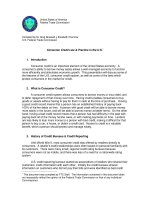Consumer credit - regulated and exempt agreements potx
Bạn đang xem bản rút gọn của tài liệu. Xem và tải ngay bản đầy đủ của tài liệu tại đây (310.15 KB, 17 trang )
Consumer credit - regulated and
exempt agreements
December 2008
OFT140
IMPORTANT - PLEASE NOTE
This document reflects the position prior to the 2010 changes implementing the
Consumer Credit Directive. Those changes apply from 1 February 2011, or earlier if
a firm opts to comply with the new rules at an earlier stage. The latest position is
set out in OFT140A - 'Consumer credit - regulated and exempt agreements'
(November 2010), which is available on the OFT website at:
www.oft.gov.uk/shared_oft/business_leaflets/consumer_credit/oft140a.pdf
.
Office of Fair Trading
November 2010
© Crown copyright 2008
This publication (excluding the OFT logo) may be reproduced free of charge
in any format or medium provided that it is reproduced accurately and not
used in a misleading context. The material must be acknowledged as crown
copyright and the title of the publication specified.
CONTENTS
Chapter Page
1 Introduction 1
2 Regulated agreements 2
3 Exempt agreements 6
1 INTRODUCTION
1.1 This guidance note provides a brief overview of regulated and exempt
agreements under the Consumer Credit Act 1974 (the Act).
1.2 The Act was amended by the Consumer Credit Act 2006 both to
bring certain previously exempt agreements into the category of
regulated agreements, by removing the upper financial limit beyond
which an agreement was not subject to regulation, and to provide for
new exemptions, with effect from 6 April 2008. A further exemption,
relating to buy-to-let agreements, came into effect from 31 October
2008.
1.3 The guidance sets out what makes an agreement regulated under the
Act and the different categories of agreement. It also briefly
summarises the principal exemptions, with cross-references to the
relevant legislation. It is not however intended to be definitive. Firms
are advised to read this guidance in conjunction with the legislation
and not in place of it.
1.4 Specific queries regarding interpretation of the Act may be addressed
to
.
1.5 This guidance note represents the OFT's view as an enforcer of the
Act. It is not a definitive statement of the law and should not be relied
upon as a substitute for legal advice. Only the courts can provide a
definitive interpretation of the law.
1
2 REGULATED AGREEMENTS
Consumer credit agreements
2.1 A consumer credit agreement is an agreement between an individual
(the debtor) and any other person (the creditor) by which the
creditor provides the debtor with credit of any amount.
1
2.2 The definition of 'individual' includes not only a natural person but
also:
• a partnership consisting of two or three persons not all of whom
are bodies corporate, and
• an unincorporated body of persons which does not consist entirely
of bodies corporate.
2
2.3 'Credit' is defined in the Act as a cash loan, and any other form of
financial accommodation - that is, any circumstances in which the
debtor is allowed time to pay. It includes a hire-purchase agreement.
3
2.4 A consumer credit agreement is a regulated agreement within the
meaning of the Act unless it is exempt under section 16 of the Act, or
sections 16A, 16B or 16C.
4
Consumer hire agreements
2.5 A consumer hire agreement is an agreement which is made by a
person with an individual (the hirer) for the hiring of goods which:
• is not a hire-purchase agreement, and
• is capable of lasting for more than three months (that is, even if it
1
Section 8 of the Act. The previous financial limit of £25,000 was removed by the 2006
Act with effect from 6 April 2008.
2
Section 189(1).
3
Section 9.
4
While it may be subject to other parts of the Act, an agreement made before I April 1977
that has not been amended in any way cannot be a regulated agreement – but see
paragraph 2.14 below.
2
is originally made for a shorter period, it is capable of being
extended).
5
2.6 A consumer hire agreement is a regulated agreement if it is not an
exempt agreement under section 16.
Running-account credit and fixed-sum credit
2.7 Running-account credit is a facility under a consumer credit
agreement whereby the debtor is entitled to receive cash, goods
and/or services from time to time of an amount or value such that the
credit limit (if any) is not exceeded.
6
2.8 Fixed-sum credit is any other facility whereby the debtor is enabled to
receive credit, whether in one amount or by instalments.
Restricted-use credit and unrestricted-use credit
2.9 A restricted-use credit agreement is an agreement to finance a
transaction between the debtor and the creditor, or between the
debtor and a third party (the supplier), or to refinance any existing
indebtedness of the debtor, whether to the creditor or another
person.
7
2.10 An unrestricted-use credit agreement is an agreement under which the
debtor is free to use the credit as he chooses.
Debtor-creditor-supplier agreements and debtor-creditor agreements
2.11 A debtor-creditor-supplier (d-c-s) agreement is an agreement made by
the creditor under pre-existing arrangements, or in contemplation of
future arrangements, between himself and the supplier, or which is
financing a transaction between the debtor and the creditor.
8
5
Section 15.
6
Section 10.
7
Section 11.
8
Section 12.
3
2.12 A debtor-creditor (d-c) agreement is an agreement which is not made
under pre-existing arrangements, or in contemplation of future
arrangements, between the creditor and the supplier, or which is
refinancing any existing indebtedness of the debtor.
9
Credit-token agreements
2.13 A credit-token agreement is an agreement for the provision of credit in
connection with the use of a credit-token – for example, a credit card.
A credit-token may also include a check, voucher, coupon or other
thing given to an individual by a person carrying on a consumer credit
business, who undertakes that on the production of it he will supply
(or will pay a third party to supply) cash, goods or services on credit.
10
Variation of agreements
2.14 An unregulated agreement can become regulated because of a
variation made to it. This can happen when the parties make a further
agreement which varies or supplements the earlier one. In such a
case, the Act regards the earlier agreement as having been revoked
and replaced by a new agreement which incorporates the terms of the
earlier agreement. This new agreement may be regulated under the
Act even if the previous agreement was unregulated.
11
2.15 This does not however apply where the earlier agreement or the
modifying agreement is exempt under section 16(6C) (regulated
mortgage contracts and regulated home purchase plans) or section
16C (buy-to-let agreements). In such cases the earlier agreement and
the modifying agreement are treated as separate for the purposes of
the Act.
12
9
Section 13.
10
Section 14.
11
Section 82(2).
12
Section 82(2A).
4
2.16 If the earlier agreement was regulated under the Act, it cannot
become unregulated because of a variation, unless the modifying
agreement is for running-account credit or is exempt under
section16(6C) or section 16C.
13
13
Section 82(3).
5
3 EXEMPT AGREEMENTS
3.1 The principal exemptions are set out in section 16 of the Act and the
Consumer Credit (Exempt Agreements) Order 1989 as amended (the
Order)
14
. Further exemptions were introduced by sections 16A-C of
the Act, as inserted by the 2006 Act and the Legislative Reform
(Consumer Credit) Order 2008
15
, and the Consumer Credit (Exempt
Agreements) Order 2007
16
.
Agreements secured on land
3.2 The Act does not regulate:
• a regulated mortgage contract, or regulated home purchase plan,
within the meaning of the Financial Services and Markets Act
2000
17
, and
• an agreement where the creditor is a housing authority and the
agreement is secured by a land mortgage of a dwelling.
18
3.3 In addition, the Act does not regulate:
19
(a) a debtor-creditor-supplier agreement financing the purchase of
land, or the provision of dwellings on any land, secured by a
land mortgage on that land
(b) a debtor-creditor agreement secured by any land mortgage to
finance the purchase of land, or the provision of dwellings on
any land
(c) a debtor-creditor agreement secured by any land mortgage to
finance the provision of business premises on any land
14
SI 1989/869 as amended.
15
SI 2008/2826.
16
SI 2007/1168.
17
Section 16(6C).
18
Section 16(6A).
19
Section 16(1) and Article 2 of the 1989 Order.
6
(d) a debtor-creditor agreement secured by any land mortgage to
finance the alteration, enlarging, repair or improvement of a
dwelling or business premises on any land, provided that:
- the creditor is the creditor under another agreement relating
to that land (and secured by a land mortgage on it), or
- the services are certified as having been provided by a local
authority or charity, or by a housing association or similar
body, or by the National Home Improvement Council
(e) a debtor-creditor agreement secured by any land mortgage to
refinance any existing indebtedness of the debtor under an
agreement falling within (b) to (d)
(f) a debtor-creditor-supplier agreement financing a transaction
which is a linked transaction in relation to an agreement falling
within (a) or (b) and secured by a land mortgage on that land
provided in each case that the creditor is one of the following types of
body:
• a deposit-taker
20
• certain specified insurance companies, friendly societies, charities
and other bodies
• certain specified mortgage companies named or referred to in an
order under the Housing Act 1985, where the agreement is
secured on a dwelling, and
• certain specified bodies corporate named or referred to in a public
general Act, where the agreement is made pursuant to a provision
of that Act.
20
Within the meaning of section 16(10).
7
Number of payments
3.4 The Act does not regulate:
• a debtor-creditor-supplier agreement for fixed-sum credit, under
which the total number of repayments of credit does not exceed
four, and those payments are required to be made within a period
not exceeding 12 months beginning with the date of the agreement
(for example, an annual gym membership payable in quarterly
instalments)
• a debtor-creditor-supplier agreement for running-account credit,
which provides for the making of payments in relation to specified
periods and requires that the entire credit be repaid in one
instalment (for example, charge cards or newspaper deliveries)
provided in each case that the agreement is not a hire-purchase or
conditional sale agreement and is not financing the purchase of land.
21
3.5 In addition, the Act does not regulate:
• a debtor-creditor-supplier agreement financing the purchase of land
under which the number of payments does not exceed four, for
this purpose, 'payment' includes payment of interest and other
charges within the total charge for credit (TCC).
22
Insurance premiums
3.6 The Act does not regulate:
• A debtor-creditor-supplier agreement for fixed-sum credit to finance
a premium under a contract of insurance relating to land or
buildings where:
21
Section 16(5)(a) and Article 3(1)(a).
22
Article 3(1)(b). Further information on the TCC and APR can be found in the OFT
publication Credit charges and APR
(OFT144).
8
- the creditor is the creditor under an exempt agreement secured
by a land mortgage on that land
- there are no TCC charges other than interest, which does not
exceed the rate under that other agreement
- the credit is to be repaid within the period to which the
premium relates, not exceeding 12 months, and
- the number of payments does not exceed twelve.
23
• A debtor-creditor-supplier agreement for fixed-sum credit to finance
a premium under a contract of life insurance where:
- the creditor is the creditor under an exempt agreement secured
by a land mortgage on any land
- the insurance provides for the repayment of the credit and
charges under that agreement in the event of the death of the
insured person
- there are no TCC charges other than interest, which does not
exceed the rate under the other agreement, and
- the number of payments does not exceed twelve.
24
Low cost agreements
3.7 The Act does not regulate:
• A debtor-creditor agreement where the creditor is a credit union
and the rate of the TCC (that is, the APR) does not exceed 26.9
per cent.
25
3.8 In addition, the Act does not regulate:
• A debtor-creditor agreement which is:
- of a type offered to a particular class of individuals and not
offered to the public generally, under which:
- there are no TCC charges other than interest, and
23
Article 3(1)(c).
24
Article 3(1)(d).
25
Section 16(5)(b) and Article 4(1)(a).
9
- the interest rate does not exceed the highest base rate of
certain specified banks
26
plus one per cent.
27
• A debtor-creditor agreement which is:
- of a type offered to a particular class of individuals and not
offered to the public generally, under which:
- there can be no increase in the rate or amount of interest or
other TCC charges
- the TCC rate (that is, the APR) does not exceed the highest
base rate of the specified banks plus one per cent
28
provided in each case that the total amount to be repaid by the debtor
does not vary by reference to movements in any index or other factor.
Examples of such agreements may include student loans, and loans by
an employer to his employees.
Agreements connected with a country outside the United Kingdom
3.9 The Act does not regulate:
• Agreements made in connection with trade in goods or services
between the United Kingdom (UK) and another country, or within
or between countries outside the UK, under which credit is
provided to the debtor in the course of a business carried on by
him, and
29
• Agreements made by certain specified creditors with a debtor who
is a member of the armed forces of the United States of America,
or an employee not habitually resident in the UK of such forces, or
the spouse or child of such a person.
30
26
Article 4(3).
27
Article 4(1)(b).
28
Article 4(1)(c).
29
Section 16(5)(c) and Article 5(a).
30
Article 5(b).
10
Consumer hire agreements
3.10 The Act does not regulate consumer hire agreements where the owner
is a body corporate authorised by law to supply electricity or water
and the subject of the agreement is a meter or metering equipment
used in connection with the supply of gas, electricity or water.
31
High net worth individuals
3.11 The Act does not regulate certain consumer credit or consumer hire
agreements where the debtor or hirer is a person of high net worth.
The exemption applies only if:
• the debtor or hirer is a natural person
• the agreement includes a declaration by the individual, in a
prescribed form, confirming that he agrees to forgo the protection
and remedies that would otherwise be available under the Act
• a statement of high net worth has been made in relation to the
individual, by a specified person (see below), and in a prescribed
form, and
• the statement confirms that, in the opinion of the person making
it, the individual received during the previous financial year an
income of not less than £150,000, or had throughout that year
net assets of not less than £500,000.
32
3.12 A statement of high net worth may be provided by the creditor or
owner (or an employee, agent or associate) if that person has
permission under Part 4 of the Financial Services and Markets Act
2000 to accept deposits. It may also be provided by an accountant
who is a member of a specified professional body in the UK, or a
professional body for accountants outside the UK. If there is more
than one debtor or hirer, a separate statement must be made in
relation to each of them.
31
Section 16(6) and Article 6.
32
Section 16A and Articles 2-5 of the 2007 Order.
11
3.13 The exemption applies only if the individual provides a declaration as
part of the agreement, and the declaration (or the agreement) is signed
by the individual. A high net worth individual can choose not to do so,
in which case the agreement will be regulated under the Act.
Agreements for business purposes
3.14 The Act does not regulate a consumer credit agreement by which the
creditor provides credit exceeding £25,000, or a consumer hire
agreement requiring the hirer to make payments exceeding £25,000,
provided in each case that the agreement is entered into by the debtor
or hirer wholly or predominantly for the purposes of a business carried
on, or intended to be carried on, by him.
33
3.15 An agreement is presumed to be wholly or predominantly for business
purposes if it includes a declaration to that effect by the debtor or
hirer, in a prescribed form, unless the creditor or owner knows or has
reasonable cause to suspect that this is not the case. 'Business' is
defined in section 189 of the Act, but a person is not to be treated as
carrying on a particular type of business merely because occasionally
he enters into relevant transactions.
34
'Buy to let' agreements
3.16 The Act does not regulate certain consumer credit agreements
relating to investment properties – typically 'buy to let' agreements.
35
3.17 The exemption applies where:
• sums due under the agreement are secured by a land mortgage,
and
33
Section16B and Article 6 of the 2007 Order.
34
Section 189(2).
35
Section 16C as inserted by the Legislative Reform (Consumer Credit) Order 2008 - see
also paragraph 2.15 above.
12
• less than 40 per cent of the land is used, or is intended to be
used, as or in connection with a dwelling by the debtor or by a
person connected with the debtor (for example, a spouse or close
relative
36
).
3.18 An agreement would not be exempt if the debtor, or a connected
person, intends to occupy at least 40 per cent of the land area at any
time, and for any period. For example, if a member of the UK armed
forces serving overseas purchases a property with the intention of
living in it on his return to the UK, but renting it out in the meantime.
Likewise, if a parent purchases a property for his son or daughter to
live in while at university, provided that (if they are sharing with other
students) they will occupy at least 40 per cent of the land area taking
into account any common areas. The exemption would also not apply
if the agreement were secured on the debtor's own home, rather than
on the buy-to-let property.
36
Section 16C(4).
13









